|
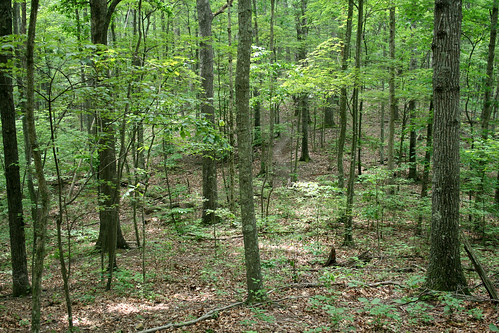
An Appalachian Forest.
(*photo credit)
August 1, 2013 August's Glorious Landscape and Praise
During this mid-summer season we observe nature in its period of maximum growth before autumn retirement and closure. Some will say that July is summer's verdant height, but much depends on the amount of rainfall. If all is normal, August is the greenest just before the tint of change that occurs in mid-month. When bounty is abundant, glory has its grandeur -- and so it can be a perfect season to see nature in it's fullness among all land forms -- hills, mountains, deserts, rock formations, valleys, and plains. August is a time of glory as found in our book (with Warren and Pat Brunner), Appalachian Sensations: A Journey through the Seasons.
--------------------------------
August -- Engaging in Summer's Conversations
Let the heavens be glad, let earth rejoice,
let the sea thunder and all that it holds,
let the fields exult and all that is in them,
let all the woodland trees cry out for joy.
(Psalm 96:11-12)
The fields and trees also tell profound stories, but these are filled with mysteries that constantly challenge us throughout life. Fields exult, and that is expressed when they speak in the blaze of
sunlight, or in the quiet shadows of evening, or the misty haze of
early morning. The weaker creepy voices of nature can sometimes be
fearful to us, such as when we are in the woodlands on a dark night. All in all, we need to find ourselves when listening and
engaging in conversation in the wild. The story is one of wonder, whether breezes blowing amid the trees, or animals rustling in the woods, or a mockingbird's repertoire. The many and varied natural voices invite us to converse with them. Why not? It's natural to speak to and among old friends.
My old Aunt asked me, "Is it wrong to talk to plants?" No, in fact, it's a good thing to do. Many folks talk to their pets, or chat with wildlife. Can't we find something to say to all creatures? If all creatures give us strength to shout with joy, let's join our voices in chorus with them. We human beings praise God and, by joining with other creatures, help enhance their instinctive acts of praise.
------------------------------------------
We hear Earth's natural music and even enter into conversation with other creatures. We eventually find an opportunity to express ourselves through words and in so many ways. All too often our prayers are only those begging, and in rare cases those thanking God for gifts obtained. A prayer of praise and blessing is worthy of our lips as we experience the expanse of God's glory in surrounding land forms. August is a worthy time to praise.
Prayer: Lord, how great your name throughout the earth!

Elephant foot, Elephantopus carolinianus. Mercer Co., KY.
(*photo credit)
August 2, 2013 Chemical Weapons Stored for Destruction, Not Use
This year the Syrian Civil War brings home the likelihood of turning those horrible chemical weapons on civilian populations that lack protective gear used by military combatants. Citizen inability to escape a gassed area paints ghastly scenes of innocents in the vise of war. The tales of World War One veterans scarred for life almost a century ago involved chlorine used in the trench warfare of the stagnant Western European theater. Even Hitler, a gassed victim in that First World War, though with little restraint did not use gas in the repeat conflict two decades later.
An operative international treaty calls for the destruction of this feared weapon arsenal and, to date, about 80% of the global arsenal has been destroyed. However, one storage facility 13 miles from here at Richmond Kentucky is "temporarily" storing the world's largest collection (523 tons) of aging chemical mustard and nerve gas shells and assorted ordnance. We say "temporarily" because the weapons were slated to have been totally destroyed through treaty obligations by 2012. Two of ten American storage sites remain with destruction to be completed, and one of these is the local Bluegrass Army Depot, on and near the site of an 1862 Civil War battle. The residues of too many wars linger here in this heavily populated area. We can't afford an accident as a postscript.
The grounds near the main entrance of this Depot are covered with massive quantities of building materials. The special structure being built at this time must be super safe and is designed with two-foot thick walls in the rare case of an explosion. It will contain the best and latest equipment to ensure that absolutely (possible?) no gas escapes in the destructive process to occur through neutralization followed by supercritical water oxidation -- a safer process than routine incineration that was used in previous chemical weapons destruction operations. Local residents are fully aware that only a very small amount of escaped gas could cause havoc. Designated escape routes and congregation points come to all our two-county residents each year as an annual calendar with tranquil scenes attached.
We hope and pray that in this final storage and destructive process that nothing goes wrong, even with a local siren system and radios to announce any danger and escape requirements. The chemical gas phase of world civilization is hopefully coming to an end, and we will breathe a sigh when it occurs. However, with a few dictators possessing some remaining quantities of chemical weapons, we are left to wonder whether they will be tempted to use them when cornered -- if Syria has not done so already. (This first draft was written in May when likelihood of use has been rumored but not confirmed). Dark humor is not a propos with such weapons still around; they need to be destroyed ASAP.
Prayer: Lord, teach us to demand a professional job in destroying all chemical weapons on this planet -- and then go after nuclear weapons with equal determination.
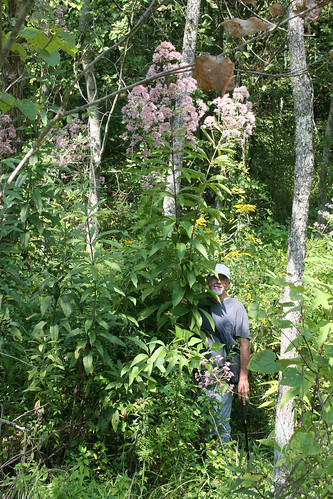
A tall Joe-Pye Weed, Eupatorium fistulosum, in early August.
(*photo credit)
August 3, 2013 Congratulations to "The Catholic Worker" at Eighty
I am not the only one celebrating an eightieth birthday this year. In 1933, Dorothy Day's "The Catholic Worker" was born in that year of lingering Great Depression, rise of Nazism in Germany, bread lines and unemployment, bank holidays, the beginning of the Roosevelt (FDR) Administration, and domestic Communist agitation.
Dorothy Day (1897-1980) along with Peter Maurin (1877-1949) founded "The Catholic Worker Movement" with whom I have been in deep sympathy much of my life. This Catholic lay-operated movement is hardly an "organization" because of its informal structure. The movement has spun off an incredible number of local groups dedicated to welcoming and feeding the poor and operating as "home" for the homeless and overlooked. The primary print organ has been in circulation for these eight decades calling attention to Catholic social principles to numerous power groups in our society. It has always been peace-oriented and a voice opposing excessive wealth and force, and in favor of the poor and voiceless in our society. Without any demands in the May, 2013 edition for permission or copyright notice, we are taking the liberty to reprint a notice from the first edition of this most worthy publication:
-----------------------
Attention Police
The first issue of The Catholic Worker is dedicated to the police of New York City, who we expect to be out in great numbers on May Day and whose attention we wish to call to the two encyclicals, The Reconstruction of the Social Order, by Pope Leo XIII and Forty Years After, by Pope Pius XI.
If the police don't want to buy this paper we will give it to them. As so many of them are good Catholics, prominent and resplendent in Holy Name Processions and at Communion breakfasts, we feel sure that they will give this issue, which is dedicated to them, their sympathetic and intelligent attention. -- May, 1933
----------------------------
Current issues of The Catholic Worker still have on their masthead "Price 1 Penny," or "25 cents per year subscription". Yes, that has been and is the price, and is well worth it and any additional donations to support their most worthy work. Send to "The Catholic Worker" 36 East First Street, New York, NY 10003. You may wish to ask for copies of the May issue that has an inside listing of Catholic Worker "Houses of Hospitality" along with addresses and listings of their own local publications.
Prayer: Lord, protect The Catholic Worker and associates who constantly remind a materialistic culture that your Spirit moves across the waters of this broken world, always beckoning us to be a little better and share a little more.

Rising moon graces the evening sky.
(*photo credit)
August 4, 2013 Trusting in Material Possessions
And I will say to my soul, "My soul, you have plenty of good things laid by for many years to come; take things easy, eat, drink, have a good time." (Luke 12:19)
Today's gospel passage quotes the fool who thinks his possessions are safe but this very night the demand will be made for his soul. Such is the reality of those who place their entire security in material goods -- and insecure people seem to be more prone to do this. Such foolishness is not uncommon in this age of heightened materialism and individual striving to store away nest eggs. When people only want enough so they will not be a burden on another, this is one thing; when stored goods fool the holders into false security it is another matter; sometimes distinctions blur between apparent necessity and over-abundance.
Have you ever entered a residence that is filled with trinkets and little items of every sort, as though these possessions define the home and homemaker? Have you gone to a household and seen cars, campers, and boats parked all about and find that possessions and their maintenance and security are the major concerns? What about possessions of a landholder who regards the size as the security needed for the latter days of life or for his descendants for some indefinite period? Such questions surface all too often in this age of high health, education, and senior citizen costs. Security through insurance policies and stock investments are all part of modern life, but they can be a consuming part.
The question each of us has to raise today is whether we as individuals have been so consumed by the anxieties of obtaining the stored possessions that we have little time for the needs of others, even those close to us. This reflection is pertinent because it can crowd out any impulse to share surpluses with others and make avarice take over lives of rich or poor or those in between. In fact, we must always be prepared to share, and that means take from our store of goods something of use by the needy. Sharing takes a confirmed resolution and deliberate action.
We often speak of a material addiction that seeps into our culture and allows for trinkets or boats or autos or electronic devices that we regard as an ever-expanding arena of necessity. What is forgotten is that this arena can seize our hearts and harden them into a cloud of material possessiveness over which we fool ourselves as controllable. A sudden jolt of health problems can unsettle this false comfort level and make us aware that grip on possessions is of short, often very short, duration.
Let's return to the Lord. Let's realize inherent insecurity of material goods calls us to look beyond. Are we willing to return to the Lord in whom we as individuals and a nation trust?
Prayer: Lord, purge the foolishness that tempts us to see
security in possessions and allow us to see you as our only trust.
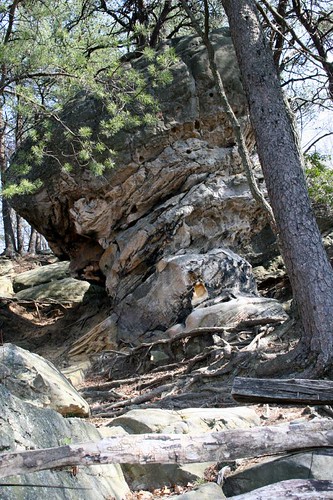
A "chimney rock" formation. Bell Co., KY.
(*photo credit)
August 5, 2013 Climbing a Mountain is Blessed
How beautiful on the mountains, are the feet of one who brings good news, who heralds peace, brings happiness, proclaims salvation, and tells Zion, 'Your God is king!' (Isaiah 52:7)
Mountains are favorite biblical places (appearing in print in the Old and New Testaments over 500 times). In this month dedicated to celebrating land forms we Appalachians give special honor to the resilient mountains all around us. They are old, and beautiful, and enduring, and mountains have the power to heal in some mysterious way. This has been part of our reflection in Mountain Moments (details on the website from Acclaim Press):
---------------------------------
Mountains are lovely, but even more so when they are inhabited. The bare feet of youngsters running, skipping, dancing and hopping adorn the land. That's good news. So are the feet of those who hobble, limp along, shift, and pause a moment for a breath -- or lie still in silent death. All add beauty. Even more beautifying are feet that tell of God's saving power -- ultimate Good News. They prove that beauty is not just in the eye of the beholder but in the feet of messengers, the ones who encourage all to share the good that is within them. We find much to be loveable here and, in proclaiming it, we give respect and courage to others to help extend their loving care to all creation.
----------------------------------
We climbed to the top of Colorado's 14,000-plus-foot Mount Crestone in the mid-morning June sunlight and stood in utter silence with the snow-covered north slope on the other side of the jagged peak in forbidding isolation. Alone but with God in the splendor of a mountain top. This prayerful experience could never be forgotten and, while lingering there, the impractical thought came to remain there forever. It was the blessedness of our footprints that gave extra meaning to the setting and gave peace to the prayerful moment when time and place stood eternally still. While some mountain moments cannot be repeated in intensity, we can have new ones where the prayer of the moment is calling us closer to God. Retreating to a mountain place is not always possible, but if it can be done once or twice, we ought to avail ourselves of such a pilgrimage.
Are mountains not favorite places with the Lord? Why is Jesus transfigured on a mountaintop? Why does he escape to such places to pray? We are influenced by the same forces that shape the hills and valleys. We are part of the aged land forms that stand to so prominently. When we accept our lives and adjust to normal life circumstances, we watch for rare opportunities to attain the mountaintops of human experience, peaks looming in everyday lives.
Prayer: Show us, O God, that you are Love and what it means to be the same; allow us to assist others in living their daily lives watchful for their unique sacred times and places.
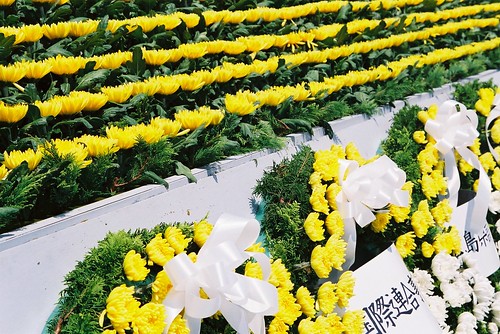
Flowers for Hiroshima.
(*Photo by Kate Nevens, Creative Commons)
August 6, 2013 Hiroshima Day, Transfiguration, and Glorification
On this Feast of Transfiguration we note the day is also called Hiroshima Day. The two on the same day seem to clash immensely. The mystery of the Transfiguration is a promise and foreshadowing of glory that is to come when Jesus is King of an emerging Kingdom. Hiroshima Day is virtually the opposite: a day of infamy when an innocent urban population in the midst of a brutal war was decimated by one atomic bomb. We celebrate the promise of a future glorification; we grieve over a horrendous act committed to shorten a war as though ultimate end justifies means of human thoughtlessness and misjudgment. We continue to suffer from that deed by justifying nuclear power in all its forms. Why expand the Uranium Processing Facility at Oak Ridge?
As mentioned on the first of this month, we praise God for the natural glory all about, and in the act of praise we make all the more glorious or participate in "glorification." We are not silent bystanders at the Transfiguration event; as followers of Christ we see the need to glorify and "redeem" marred beauty. Thus, a selective approach of seeing only nature as pristine and of avoiding damage done though human misdeeds is not proper celebration of this feast. We are called to help glorify an unfinished creative process in part through needed repair work.
The destruction of Hiroshima reminds us that human beings have the power to destroy something that is good -- a city where people live. This power is present and is hidden in every nuclear sub and silo and aircraft with bombs aboard. Merely refraining from unleashing this power does not deny its presence; repair means stopping the insanity of possession of these devices. In other ways we see examples of destructive power in removing mountaintops and eroding arable farmlands and clear-cutting tropical forests.
Glory rests in the praise we give and in the power to rebuild. We give both words and deeds of praise. If transfiguration is to occur in its fullest sense, we are called to do more than speak. We must turn eroded landscape into fertile farmland. I recall my Dad turning a neighboring broken down farm into a productive landscape through stopping erosion, seeding land, and spreading local crushed limestone rock on the pasturelands. Gradually, damaged fields became areas of improved productivity; the lesson he taught was that we can assist in glorification but it takes effort.
Now, in realizing our role as a social body that has harmed others through weapons of mass destruction, we are prepared to repair and give glory. We do this so the promise of transfiguration may be hastened, and God's kingdom comes. The act of bombing Hiroshima is certainly not celebrated, but God's forgiveness is, as is our resolution to heal our wounded Earth. Glorification comes in making restitution for past misdeeds.
Prayer: Lord, allow us to see in the Transfiguration event the call to make ourselves ready to help glorify our wounded Earth.

Buffalo Mountain, TN, wind farm.
(*photo credit)
August 7, 2013 Wind: Will It Be a Globally Accepted Fuel Source?
Wind power appears to have a very bright future, especially with 282 GW of global power generation this past year, which is ten times the amount of one decade ago (and growing at 25% growth rate per year with even faster increase in China). That rapid wind-power growth has its yearly ups and downs due to changes in tax policy and the relative condition of other energy sources.
First, the biggest complication from an American viewpoint is the sudden rise in cheap natural gas through the recently developed fracking process. This fuel's price has declined by 70% from 2005 U.S. levels though natural gas still commands far higher prices elsewhere (Asia and Europe) in the major energy-consuming world. Lower cost American natural gas has cut into the coal and nuclear arenas but also some sixteen states are backtracking on goals for renewable energy in the coming years due to this cheap fuel. Even with far lower startups, renewables find it hard to compete.
Second, incentives are in place for short designated spans of time, and this causes the incentives for wind projects to rise and fall with great rapidity. Obviously, this is difficult for those making longer-term utility commitments, though it takes far less time to develop wind farms than nuclear power facilities. Investment incentives are also uncertain on local and state levels due to financial constraints and to many red states' aversion to renewable energy replacement of fossil fuels.
Third, wind is not that popular in some part of the world such as in Japan, much of Africa, Southeast Asia, and Eastern Europe. On the other hand, Western Europe has had a wind leadership role for decades such as in Denmark, Germany, and Spain. Furthermore, a wind race among certain countries is going full tilt; China has over a 75 GW capacity and the U.S. 60 GW, with both rising fast in close competition. Today, at latest count wind accounts for 4.32% of U.S. electricity generation and rising. Germany has 33 GW of wind capacity and India is fourth in new installations in 2012. In the EU-27 wind continued to hold much promise in 2012 with 11.4 additional GW capacity, but this was surpassed by solar with 16.8 GW increased capacity.
One bright spot for both American wind and solar futures is that pressure is on to export surplus U.S. natural gas to Europe and Asia; unfortunately for American consumers this will drive up domestic prices, but eventually make renewables more competitive. Other factors in wind's favor include the rapid decline in coal's fortunes as the fuel has added environmental regulations and the coal's rising costs and inability to compete with gas and renewables' electricity generation. However, with the increased emphasis on fossil fuel replacement due to climate change consequences, we can start to expect a prosperous wind future.
Prayer: Lord, inspire us to use those resources that cause least harm to people and planet, and do so immediately.
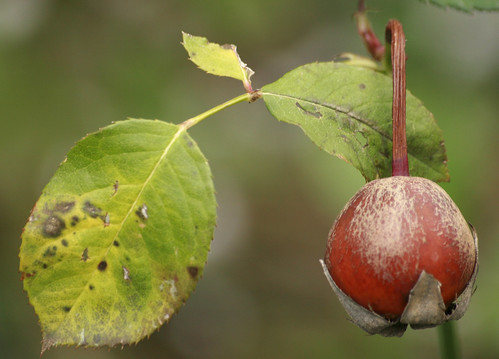
Ripening fruit of the persimmon, Diospyros virginiana.
(*photo credit)
August 8, 2013 No-Growth Philosophies Are Hokum
May the sweetness of the Lord be on us! Make all we do succeed. (Psalm 90:17)
Gar Alperivitz speaks of a transformative change in the economic institutions "that are not required to grow." What Then Must We Do? Chelsea Green, (2013) p. 108. I like much of what he says in the book as it pertains to the modern American economic system and its current problems (inequality, disparity of wealth, erosion of democratic values, global climate change, etc.) and the facts that back these up. We must come to know the current situation and be resolved to do something about it. Material no-growth goals are needed for sustainable living, especially in a culture that is so heavily laden with the consumption burden of almost one-quarter to one-fifth of the world's resources. This nation must cut back for the sake of our limited planet and in order to share with others who have essential needs.
However, growth is necessary. While one may speak in the secular sphere of "no growth" economics as a goal, this is to break the prevailing culture that companies strive to grow and prosper at all costs. On the other hand, to say we are not "required to grow" spiritually in a physical world goes counter to the human spirit that always seeks growth. We must continue to mature, and so pure no-growth strictures that stand apart from a deeper growing of the spirit within us are jarring to many -- including me. We have to leave the materialistic mindset that so fashions the human in the worldly setting. Would that economic institutions have a non-profit (meaning material profit) basis and then proceed to help establish that workers within companies are to grow spiritually over time as well as emotionally, culturally, intellectually, and with ever advancing wisdom with age.
The problem when confined to a secular discussion (which may include some American religious circles) in our secular world is that it is simply not satisfying to speak of "no-growth." It contradicts the human drive within the serious person, and rightly so. Some would say that the end result should be private growth while the institution remains non-profitable through its constitutional structure. The limits of the non-profit are often a barrier to some sort of success that includes growth in some form.
The problem only resolves itself if we see success in spiritual growth, not so much reward, but the ability to do what
God wills for us and do it well. We need to clarify our insight in our stance before the Divine Majesty. We are meant to grow ever nearer to perfection, but this comes with maturation and effort. It is growth nonetheless, and immensely important growth. Material growth alone is self-defeating. And no-growth economics is no substitute. As human beings we need spiritual growth.
Prayer: Lord, help us understand the true nature of our
impulse to grow, and to do this in spiritual ways.

Wingstem, Verbesina alternifolia.
(*photo credit)
August 9, 2013 Gun Controls or Controlled by Guns
People on the FBI's terrorist watch lists tried to buy guns and explosives 1,453 times between February 2004 and December 2010.
Testimony before the Senate Committee on Homeland Security
and Governmental Affairs, USGAO, May 5, 2010.
The first draft of this reflection was written in April, when several very timid pieces of federal legislation on control of certain guns and ammo, as well as loopholes in gun checks for those on the FBI terrorist watch lists, were all defeated by a coalition of red state senators including four Democrats. A nation with 90% in favor of gun control of at least a limited degree was outraged, and rightly so by such a blatant defeat. The bullying of the gun industry and lobby was ever so obvious.
How can so few among such a majority exert so much power? It is the power of GUNS, the topic of our upcoming work that is in a first draft. Never was a subject in such demand for national review and challenge, for the arsenal of military-type automatic weapons and their multi-round clips continues to grow. We await one more catastrophe to drop on a small classroom, movie theater, or worshipping community when the crazies want a moment of headlines and a chance to show off their arsenal. We are a nation cowed in the shadow of the gunowners who forget that they are the bullies on the block and the public is overly confused as to its exercise of free expression.
Congress is a major (but not the only) culprit. In some ways a distracted public fails to apply the pressure in sufficient force to bring about substantive change. For more than five years this Congress has stalled on even a serious debate of legislation originally drafted during the Bush Administration. This would have closed the terror gap then and again this year after the Boston Marathon, the latest of a series of misdeeds within a permissive society. Some want their gun arsenals; others want their drugs and still others want their billions in tax havens -- and the common good be damned! Those of us in the public interest must speak.
Unfortunately, we are a long way from gun control in this country that aches for additional controls on military conduct and expenditures. The harsh ingredients of a permissive society, a misunderstanding of constitutional rights to a local militia, and insecure individuals who have found favor through bullying add up to lack of meaningful legislation and controls. Guns are simply out of control and we will have to pay the price -- especially the next gathering of innocent individuals who are easy targets for a crazy in some unsuspecting community of this fair land. We can never heal a wounded Earth if such uncontrolled arsenals abound, and no teeth are in laws and regulations to bring about controls of the most elementary nature. Must this insanity continue?
Prayer: Lord, bring us to our senses and ensure we act with a kind heart and through protection of the innocent.
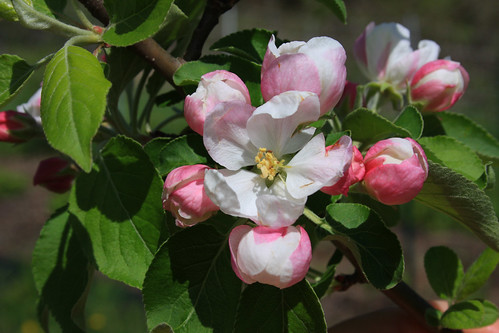
Fresh spring apple blossoms, future fruit for summer harvesting.
(*photo credit)
August 10, 2013 Smells of August: Preserving Produce for Winter
The characteristic smells of August are both natural and human produced -- and the latter more pronounced during this harvest month. I can vividly recall the smell of ragweed carpeting pasturelands with its heavy pollen in the air. Then there is the smell of silage and the beginnings of fermentation of the corn and cane mixture as it is blown into the storage space. There is the faint but distinctive smell of fresh-picked produce from orchard and garden. But the most distinctive smell of August is the kitchen where Mama preserved the surplus fruit and vegetables. This has been captured to some degree in our available book, Appalachian Sensations, with photographs by Warren and Pat Brunner:
-----------------------------
August -- Putting Food By
YHWH smelt the appeasing fragrance...
(Genesis 8:21a)
We hungry youngsters were always drawn to Mama's kitchen, especially for supper. During summer it was especially a favorite time, because that was when the strong sweet smell of the day's canning pervaded the steamy environs. The excessive supply of fruit -- cherries, plums, blackberries, peaches, grapes, and apples -- was turned into tasty cobblers. Mama was proud of her day's work and, while we ate, she showed us jars lining the marble counter top, which were cooling before being taken to the cellar storage area. There were sweet and dill pickles and relish, pickled pears and watermelon rinds, mincemeat made from green tomatoes, as well as strawberry, grape, and blackberry jam and jelly, and apple sauce. And plum marmalade became the basic ingredient for her famous Christmas puddings.
During those pre-air conditioning days we hardly thought about how difficult preserving food by canning actually was. When the steamers were used for "cold packing" beans and non-acidic produce, the place became even more heated. Perhaps that was why early homesteads had separate summer kitchens. We didn't have one, and so Mama endured her purgatory on Earth. Non-canners do not really appreciate the effort it takes to cook and preserve food. We love fragrances that wet our appetites, and we enjoy finished products, but we must not fail to thank the cook. Do we take summer's bounty for granted, and the ones who take time to preserve it?
-------------------------
Prayer: Lord, the delightful sensations of our nose faculties remind us that you are Creator of all good things worthy of being captured and enjoyed. Thanks for fragrances that are so wholesome and for the labors of people who have sacrificed to bring these to our senses through their hard work.
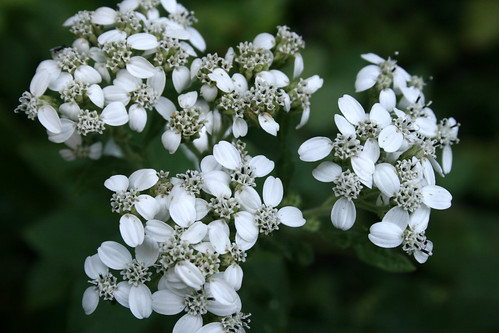
White crownbeard, Verbesina virginica.
(*photo credit)
August 11, 2013 Sacred Trust: Responsibility to Heal Our Earth
When we have had a great deal given to us on trust, even more will be expected of us. (Luke 12:48)
Human beings have the great gifts of intelligence and free choice. With these we can do good or evil. As intelligent citizens we can see ramifications of our actions and how they can affect others. Our Earth is more than a place where we work out our individual salvation for a relatively short time span; in trust, we work together with others and with the expectation that Earth will be a more perfect place because of our presence. A great deal has been given and so much is expected during our stay.
As intelligent beings, we have a history of skills, science, and technology to make vast improvements to what we find in a place. Land can be productive, comfortable housing established, roads built and maintained, communications over long distances achieved. The tools are available and with proper use can benefit others. Our gift of intelligence is a sacred God-given trust to continue the great work of creation that has begun. We can know ourselves, work together, and participate in glorification.
As free decision makers, we know that not every action is intelligently performed. We see possibilities of doing good turned to conflict, warfare, and a host of misdeeds. Our sacred trust is vulnerable. A well-grounded spirituality involves knowing how we have missed the mark, ways we have performed misdeeds, and our neglect of halting harmful misdeeds by others. We bear in our collective selves the sad history of not living up to expectations. We have allowed others to suffer when they could have been healed and given responsibilities for helping with the improvements needed on our Earth. We tolerate disparity of wealth and unemployment.
Individually, we each must strive to be responsible for the skills given and the deeds required. Understanding the sacredness of the call to action adds quality to our intended responses. God has entrusted much to us -- reading skills, comprehensive talents, reflection periods and energy to take effective action. Our degree of appreciation for the call comes in the quality of our responses. Granted there is only so much we can do, but an attempt is the important thing even if the result is imperfect.
Socially, we realize the limits of individual actions and thus must participate in cooperative work with others. This involves filling up what is wanting in the suffering of Christ. We help save the wounded world in which we find ourselves, accepting joint responsibility through insisting on proper and fair governing of limited resources at hand. Our calling is to make proper repairs on what is damaged and to share resources for the benefit of all as part of the sacred trust of reclaiming the commons.
Prayer: Lord, help us to know the trust you give us, and to
respond to the call to heal what has been wounded by human neglect.

A katydid, waiting to call on a summer's night in Kentucky.
(*photo credit)
August 12, 2013 Should We Brag about Our Good Deeds?
Recently, a parishioner asked me the title of this reflection. Our automatic response is not to brag about anything, but that may be too dismissive. We are turned off by the word "brag," which has a sense of pride in our own goodness or an inflated sense of our deeds done with the false notion that we are the origin of good. Let's phrase this somewhat differently. Should we publicize our good deeds?
Ours? The answer to essentially the same original question is "yes," and the content of publicizing may be exactly the same. What makes the difference? First, we do not pretend to be the author of good deeds, for the inspiration comes from God, the author of all good things. They are "ours" only in some degree of connection or service that we perform. Jesus tells us that we are like the servant who comes in out of the field and yet is expected to prepare the meal for the master. The point is not discovering a good cause to rebel against a privileged master, but our own attitude in being called to service. Yet, the deed performed is a good one, but we do this and thank God we are able to be of service -- and that is an honor.
Brag or publicize? The content of the message may be the same but much depends on how one toots his or her horn. Does it call attention to oneself or does it announce that God is being glorified through the good deed? It is part of our evangelistic faith that good things be known to others, for far too much media space is taken with the dastardly deeds of deceit and terrorism in our troubled world. Speaking of good deeds is like a drink of fresh spring water; it ought to be done. It is easy enough to cover up that any of us actually participated in the performance, or give some of the other parties in the good deed the credit even when they may not fully deserve it -- for God is the author of all.
Should we? We take the words of the title in inverse order, but maybe for a purpose. Far too little good is accepted as worth mentioning today because of fear that we may be thought to be bragging. If we make God as author of all good and then find that we are humble servants of what is achieved, then we magnify the Lord, which is what Mary did in the Magnificat. She says that all nations would call her "blessed" but that is not bragging -- because GOD has done good things through and for her. Praise in understanding that being party to a wonderful deed makes us blessed among all others. If we realize power of the good deed, then we are able to "incarnate" (put flesh on) the Word spoken to the human race. To publicize through song (Mary), homily, poetry, facial expression (Elizabeth), or dance (John the Baptist in the womb), is to give glory to God through deed.
Prayer: Lord, teach us what to say and how to say it with the emphasis on your praise and glory. Help us acclaim Good News from the roof tops, but just be sure it is really God's Good News.
Rebecca Simpson
A month ago today (on July 12th) Becky Simpson passed from this Earth after a long illness. Becky was a remarkable person, director of the Cranks Creek Survival Center, leader in social justice and community improvement in Harlan County, recipient of Newsweek's Kentucky Woman of the Year in 1992, and a person who served for a decade on the ASPI board of directors. Becky taught us much, and one thing in particular is that people of low income (living on her husband Bobbie's disability check) can still operate a non-profit organization with sizeable achievements -- hundreds of homes repaired over the years. Theologically speaking, Becky proved that the lowly in God's grace can rise, and do not need the wealthy to lead the way. She was a living testimony to a hope-filled future for all on this Earth. May she rest in peace. Al Fritsch, SJ
Read more here:
 Obituary Obituary
 Louisville Courier-Journal article about Becky's work Louisville Courier-Journal article about Becky's work
 Becky's story from Yougottomove (click photo): Becky's story from Yougottomove (click photo):

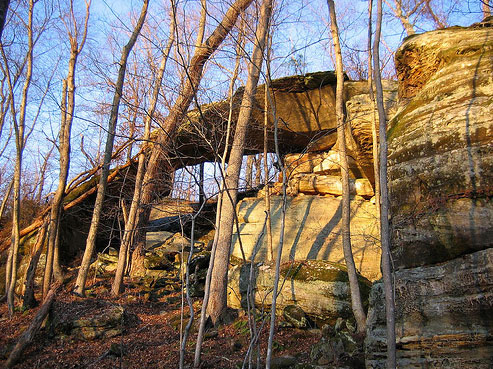
Raven Arch. Carter County, KY.
(*photo credit)
August 13, 2013 Rock Formations, Cliffs, and Natural Bridges
In this month when we celebrate the land forms of our Earth, we ought to focus for a moment on the rock formations that decorate our planet. Within my parish are two such unusual areas, the Red River Gorge and the Kentucky Natural Bridge. Add to this the formations above the ASPI Nature Center which helped give the name "Rockcastle" to the county where I resided for a quarter of a century. The rock facings in each of these sites are picturesque and are recognized by one million visitors to our wilderness area annually. They are attracted to state-run facilities and come for sightseeing, camping, hiking, and rock climbing.
Rocks offer thrilling moments. Once, when hiking in the Rockcastle hills with very dense underbrush, we came upon a cliff edge and it was only a step ahead (overhanging foliage did not allow a clue as to danger). I will never forget the near miss. Those of us either living here or visiting realize the utter beauty of what these rocks provide, but also the need to respect them and show care because of associated dangers. Each year several people are injured or lose their life in these rugged areas, but for the greater part many are fulfilled in seeing and experiencing the raw nature of our rock formations. In younger years, I rappelled from the cliff formation and found this a thrilling nature experience. Would that all people could appreciate these formations at closer range, for we need to touch our Earth, even the rugged parts.
Rocks have character. To rest on or near rocks gives us some brief time to reflect on their firmness and their seemingly unchanging quality (see "Unchanging Rock," Jun 29, 2006). On hot summer days, rocks have a warmth that radiate into our whole being. They seem so unfinished and capable of demonstrating the act of creation itself, something still being achieved. In a concrete fashion rock formations express the grandeur of the universe. Much depends on their setting, for rocks show character when at sea or lakeshore, when in gorges and breaks of ancient rivers, and when in deserts and mountainous terrain. Those who journeyed to the moon speak of the contrast between moon rock and Earth rock. All are fascinated by the beauty of rock in all its uniqueness.
Rocks are ideal places to pray. Consider that each of us needs to find the sacred place where we feel closer to God. In fact we may like to return over and over, and yet many of us appreciate fresh locations for a once-in-a-lifetime experience. I recall being on a castle fortress area in Alsace in France and feeling close to God, and yet I would never be there again. We need to expect that the character of the rock formation enters into our repertoire of unique experience and adds flavor to our lives. It is fitting to perch on a rock and spend time in prayer and meditation (see "God is the Rock of Refuge," January 8, 2008).
Prayer: Lord, you are our ultimate security, our "rock of ages," our anchor, our point of refuge, our fortress in times of danger, and our stepping stone to eternal life.
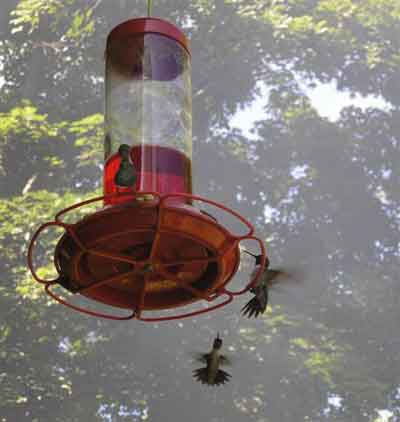
Hummingbirds learning to "share".
(*Photo by Sally Ramsdell)
August 14, 2013 What about "Radical Conservatives?"
In January a multi-millionaire Floridian businessman said he was willing to bankroll my projects if I only speak favorably of the capitalistic system and deny that climate change was anthropogenic. It sounded so simple and for a brief moment I was tempted to try practicing so-called "Jesuit equivocation," which I had heard about. However, in refusing the offer I found the fellow overwhelmed that someone would refuse his six-figure largesse, and thus not accept that capitalistic endeavors had made him wealthy. C'est la Vie! Strangely, he invited me to give him a political/ economic category in which I belong so he could perhaps attack it.
How do you tell someone that exerting power through wealth is not a conservative practice? It wastes limited resources to gain and secure (through expensive military systems) ill-retained gain. The privileged depend for favor on powerful governments to retain their ill-gotten loot and, all the while, disparage the very governments they depend on to ensure their privileges.
True conservatism involves three criteria: an individual level to hold fast to age-old social values believing in the right to life of all people including the unborn and aged, and the support of traditional marriage (see Daily Reflection under specific topics); on the local social level to hold to sustainable living and financial practices in community so that these are healthy places to live (see 99 Ways to a Simple Lifestyle and Healing Appalachia); and on the global level to champion basic respect for the rights of all people on this planet and the health of the planet herself (see Reclaiming the Commons).
This last criteria is the most misunderstood. The first (individual rights) harks back to basic Judeo-Christian values and stands in contrast to a libertarianism that is based on enlightened self interest, a position fraught with unconcern about others. The second criteria incorporates local community organizing, support for appropriate technology, local financing of development, and worker-controlled employment opportunities; here conservative values are deeply entrenched and hark back to basic democratic principles on which this land was founded.
The third level involves radical sharing of resources with those in need as described in the early chapters of Acts of the Apostles -- a rather ancient document. Today, through modern means of communication, neighborhood is Earth and sharing takes on global dimensions demanding controls on finances and environmental protection, so as not to pit one nation or state against another in a bidding war of downward working conditions and wages. This federalizing of financial and environmental concerns makes this an inherently conservative position. Thus is radical conservatism something worth supporting.
Prayer: Lord, help us to know who we are, to be willing to
see reality, and to have courage to defend our unpopular stances.
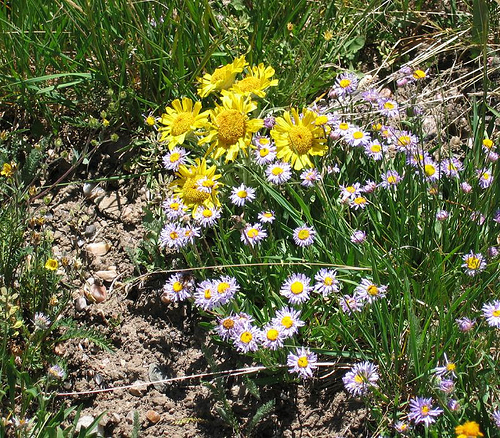
Alpine Wildflowers in summer. Medicine Bow, WY.
(*photo credit)
August 15, 2013 Mary: Entrusted Instrument of God's Grace
On each August 15th we Catholics celebrate the Feast of the Assumption, the very ancient tradition from the earliest century of Christianity. We recognize that Mary was assumed bodily into heaven. On this day we recall the great gift that God gave to Mary and, in due time, gives to us through the Lord's redemptive graces.
First Reading (Revelation 11:19 to 12:10). The woman mentioned in this book is surrounded with light for the sun clothes her and the moon is at her feet, with twelve stars making a crown circling her head. Heaven and Earth unite within her body, for Mary is the Ark of the Covenant, the dwelling place of our God. In this account, the dragon representing the world's evil allurements is ready to devoir her child but cannot overcome the powers of heaven. Mother and child are in the midst of a cosmic struggle.
Second Reading (I Corinthians 15:20-27). Through our first parent Adam, death came into the world; through Christ comes life. Jesus is now raised from the dead and lives eternally in glory. He is the first to enjoy the fruits of redemption in the glorious resurrection of which we will all enjoy in due time. Through sacred tradition we hold that Mary goes before us, just as she went first in the coming of the Messiah. Through God's grace her body and soul are in heaven.
Gospel Reading (Luke 1:39-56). Mary visits Elizabeth and realizes that both are pregnant by divine grace. Both offspring will be instruments of the divine plan and John the Baptist leaps in joy to be so near the Lord and his mother. The ancient Magnificat hymn is inserted into the text here. As mentioned in numerous previous feasts on this day, the world around us is turned upside down, and Mary recognizes this in saying the rich will be brought down and the lowly will rise. The words resemble Hannah's prayer at the birth of Samuel (I Samuel 2:1-10).
The tradition of Mary being bodily taken into heaven follows the Old Testament tradition that this occurred with those who played important roles in salvation history (Elijah, Moses, and Isaiah). Mary is truly the instrument of God's grace and plan for salvation. Mary is liberated through her great trust in God and thus becomes the model for each of us. We are not to put her on a pedestal, but rather see her as going ahead of us as a sure sign of what will occur at the end of time for all of us.
Mary is instrument of the coming of the Lord into our human history and she is also the instrument for upending the status quo world of materialism. This occurs through her trust in what God has done for her; she trusts God; God entrusts to her a special role. In turn, we are to learn from her trust to likewise trust in God and realize in faith that God entrusts much to us as well.
Prayer: Lord, teach us to follow in Mary's footsteps of trust so that we can be more ready instruments of your love and mercy.

Enjoying catnip in the garden.
(*photo credit)
August 16, 2013 Garden Hints for Late Summer
These suggestions have been said in various ways before, but as we approach autumn, we know that with wise use of resources and selection of plants we can extend the growing season well past the soon-coming first frost. Again, these selections are geared to my micro-climate and may not have direct bearing on your particular situation. But the hints may help in your own survey of what ought to be done in late summer given your specific conditions.
* 'Sow autumn turnips near the Feast of the Assumption' was a saying that my folks brought over from Alsace -- and it is a good time mark to follow in this country as well;
* Give special emphasis to all the Brassica family of vegetables, and that means starting plants early enough to have autumn collards, mustard, kale, as well as broccoli, cauliflower, and Brussels sprouts;
* Protect delicate plants against the late summer sun for this may be necessary for autumn productivity;
* Assemble cold frame materials so that the cherry tomatoes can continue to bear well past frost in October and on under protection to the end of the year;
* Prepare space and pray for enough rain for the growing of radishes, endive, arugula, Swiss Chard, and other autumn greens, along with autumn peas that do well in cooler times;
* Water late cucumbers and continue to preserve the surplus crop throughout the bearing season. This may be too late for sowing more hills of cucumbers that could bear before normal frost for they would need extensive protection in order to produce in the weeks of late September and October;
* Prepare to harvest the papaws that are ripening right now along with late blackberries and peaches, and the first-of-the-fall apples and pears. Gather and prepare the coming year's supply of jewelweed for medicinal purposes;
* Taste the wild cherries and gather some of the last of the mulberries of the season along with pokeberries for medicinal purposes;
* Cultivate the late flowers (cosmos, mums, etc.) that will help grace the garden in the coming months. It may be necessary to buy some autumn flowers to beautify the place or to gather in the wild flowers (goldenrod, ironweed, and bush phlox) for table decorative arrangements;
* Give away or exchange surplus produce with friends and neighbors;
* Offer to care for and water gardens when neighbors are away for a few weeks;
* Patronize the farmers' markets at the height of their popularity for late summer corn, eggplant, late mushrooms, extra canning tomatoes, and melons of all sorts; and
* Chop out the summer weeds that seem to creep in during the hot weather and dispatch them before they bear seeds.
Prayer: Lord, thank you for the summer plenty and the time to enjoy the tastes of August in the produce we grow.

Valley Pike covered bridge, Mason Co., KY.
(*photo credit)
August 17, 2013 Emil Kapaun: Continuing American Heroic Traditions
We all need heroes; on this birthday (1786) of Davy Crockett
we look for authentic Americans who carry on the traditions of the Texan pioneers who died at the defense of the Alamo. In fact, it is customary to find those heroes in war situations where they sacrificed their lives for others.
An authentic American hero in that wartime tradition was an unlikely one at the start of his life on a farm in the Kansas prairie, namely, Emil Kapaun. In April, some 62 years after his death in a Northern Korean prison, President Obama gave Chaplain Emil Kapaun the Medal of Honor. Emil left the farm to become a Catholic seminarian and priest and at the time of the Korean War volunteered to be an army chaplain.
His heroics were described by survivors of the war in talks and printed media including The Saturday Evening Post (January 16, 1954), and these who he influenced in life became champions for his cause to receive recognition for his bravery. It was the talk of Korean War reunions and in communications among survivors who knew him. He was dedicated to his men, and they would kid him and say he went straight to where the battle was most fierce, in order to tend to the wounded and dying, even carrying the disabled himself back for medical attention. He went to the battle noise knowing that soldiers were hurting. President Obama noted his heroism in the battle of Unsan, and that many of the members of the Third Battalion, Eighth Cavalry Regiment credit their emotional and physical survival to the efforts of Chaplain Kapaun.
Emil Kapaun was true to his calling and stayed with his comrades when the combat group was surrounded, and went to prison with those who survived the battle -- and there the struggle for life reached a climax. Conditions were extremely primitive; food was short and of a very poor quality; and life for all prisoners was sure misery. Emil used his ingenuity in obtaining food where possible even through "stealing" from guard supplies and from the landscape around. His greatest fault was failing to take all of his own ration but, instead, sharing it with those he regarded as in greater need. Eventually racked by pneumonia and dysentery he passed to his heavenly reward at the prison in 1951.
A final recognition may be still forthcoming. The cause of Servant of God Kapaun for sainthood is now being pursued by the Wichita Catholic Diocese -- and this is an equally hard journey. Two miracles must be credited to his intercession. A potential one is a college student who suffered a life-threatening injury in a pole vaulting accident; a second incident is a teenage girl who was healed from a liver and lung disease. In both cases their families and friends prayed for healing through Emil Kapaun's intercession.
Prayer: Lord, we so need heroes in our lives; give Emil Kapaun's cause a boost so that he may be both a national secular
and global spiritual hero for young people today.
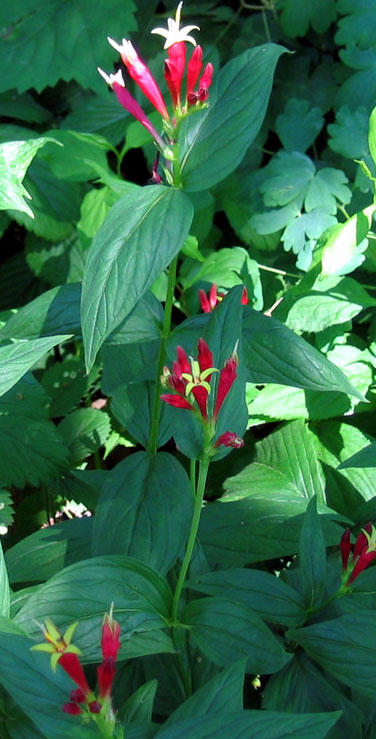
Indian pink, Spigelia marilandica. Franklin Co., KY.
(*photo credit)
August 18, 2013 Charisma: The Art of Setting Strategic Fires
I have come to bring fire to the Earth, and how I wish it were blazing already! (Luke 12:49)
A charismatic person can start a fire. Is this not what the Lord wishes of us as quoted in the Luke verse above? Fires can be good or bad, controlled or allowed to go wild. We talk much in these reflections on fire safety and protection from careless or accidental fires -- and we respect their destructive aspects. But fires can be controlled and even utilized blessings for keeping us warm, cooking our food, smelting ore, or even inciting another to action. The last more energetic "fire" is our focus here. Those with charisma have a special gift for kindling fire in others.
A charismatic person can do harm. Not all fires burn for good causes. Notorious leaders such as Hitler were charismatic and could draw people for the wrong causes by the fire of their rhetoric and emotions. Being "on fire" through misdirected or evil intent is extremely hard to redirect. Emotionally swaying people to wrong causes is hardly a lofty goal and is fraught with terrorist consequences. Even religiously motivated charismatic action can become extreme and cultic in tone. It may be best not to attempt a frontal confrontation but to say some prayers and hope the right person meet the follower to inspire a reordering of life.
Charismatics can do good as well. The power of their own persuasion can overwhelm charismatic individuals and their followers. One must propose a delicate line between the exercise of that power and the freedom still to choose. Extremism can be a form of terrorism, and those incited to fever pitch in the name of God or Allah or anyone or thing must realize the power of the fiery words, and dampen rhetoric to some degree. Easier said than done.
The non-charismatic can also light fires. In quiet ways these can inspire others; a perfect example is the founder of the highly successful Spanish Mondrago cooperative Corporation, Father Jose Maria Arizmendiarrieta, who was inspiring by always "needing" help in carrying out goals -- and those near him rose to the occasion.
Fire can be lit in quiet ways and marvels can result.
Can those with a few charismatic gifts rise at the proper time and place and kindle a fire of faith in people who are allured by material things of this world? Would that they could bring on genuine enthusiasm with its balanced approach and staying power. Can they reach the social addicts of our society who appear paralyzed through their allurements to drugs, Twitter, or alcohol? Can fire be lit to touch the dull, the lazy, and those who have given up? We can only say so many words. A far better approach is a combination of prayer and persuasion.
Prayer: Lord, set us on fire during this year of faith. Help us to enlighten those dulled by false allurements and to be able to
be models for setting them on the right path.
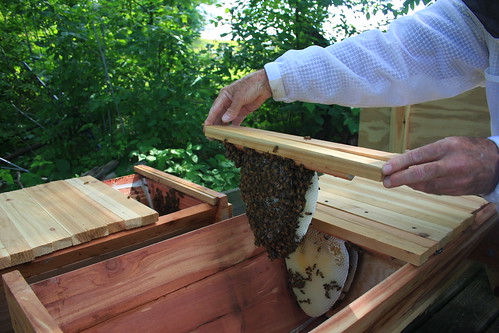
Transferring a colony of honeybees.
(*photo credit)
August 19, 2013 Europe Bans Pesticides in Honey Bee Die-Off
People especially in Europe and North American have shown concerns about bee population declines in what is termed Colony Collapse Disorder (CCD). Americans have noted one-third bee disappearance each winter since first reported in 2006 and even more in 2012; some European nations estimate losses as high as 80%. Serious environmental phenomena and disasters are handled in three stages: discovering the problem, determining the causes, and implementing solutions. Certainly beekeepers and farmers needing bees for pollination observe decline and seek causes. According to a May report by the US Department of Agriculture and USEPA multiple factors exist including parasitic mites, multiple viruses, poor nutrition, genetics, habitat loss and pesticides far down the litany. Are they right in this evaluation? USDA says "You can't parse any one (factor) out to be the smoking gun," but groups like CREDO Action for Working Assets object to this assessment.
On the other side of the ocean, European-originated activist group "Avaaz" is mounting a campaign to ban neonicotinoid pesticides -- the focused chemical pesticide culprit found in dead bees. Early actions in France led to the ban in January, 2011 after a million signatures were delivered to the agricultural ministry. Protests became European-wide this year and the European Food Safety Agency found that this group of pesticides posed unacceptable risks to bees, over objections from Bayer and other chemical manufacturers. A two-year EU ban is now in effect in over half the EU nations. Defenders of the ban say that in America $15 billion of benefits are at stake for not following suit.
Note that European activists have mounted such a concerted and effective drive through social media -- all focused on one issue and cause. European activists are now becoming more successful than American ones. Have they pinpointed the actual culprits or at least the major cause of CCD? Current scientific evidence regards the chemicals as a cause. Some report that in died-off hives the bees seem to have identified the threat of pesticides and taken measures of sealing off hive cells containing higher levels of pesticides from neighboring cells. Also it is noted that one of the pesticides, "clothianidin," was approved against alerts of its own scientists in 2003 just before CCD first reports. Do toxic chemicals make bees disoriented or immune systems compromised?
Losing honey bees in Europe is a disaster, but it is also worrisome for specialty growers in America. The delicate food chain is being threatened without these bee pollinators. One cannot hand pollinate an orchard. The planet is still blessed by numerous pollinators, but the honey bee has been a workhorse that is a key in large-scale agriculture. At what point is more study demanded when bee populations continue drastic reductions? Yes, chemicals are virtually ubiquitous and bee immune systems delicate, but dramatic steps are called for.
Prayer: Lord, give us courage to take action when called for.
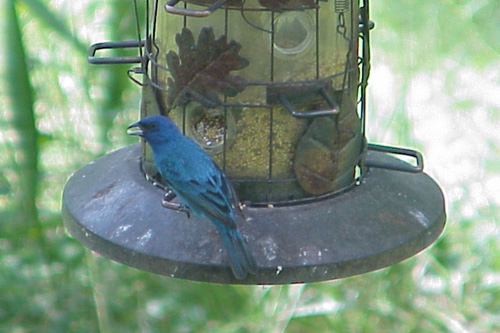
Indigo bunting, Passerina cyanea, at feeder.
(*photo by Sally Ramsdell)
August 20, 2013 Birds, Threats, and Pet and Feral Cats
During these Bald Eagle Days we look back at the prosperity of our national bird and, in fact, all forms of wildlife. Our lives are enhanced by birds far more than we admit, giving us untold pleasure by their presence among us. Who cannot be inspired by bird songs of great variety and by the flitting about and nesting habits of colorful birds? Mockingbirds give so much joy in certain times of the year. Let's look at certain threats to bird populations that are not adequately addressed:
Pesticide threats. In reference to the once endangered bald eagle, we recall how hardness of shells of eagle eggs was affected by the use of DDT in the environment, and thus hatchlings were scarce. By banning the extensive use of this pesticide through federal protection the eagle is bouncing back from near extinction. Questions are also being raised about other ubiquitous pesticides and chemicals and their threats to birds and other forms of wildlife such as honey bees (see yesterday's reflection).
Commercial threats. John J. Audubon saw little danger in hunting due to bird abundance, though the last passenger pigeon that blackened the sky of Audubon's youth died a half century after his death. The fashion of the late 1800s was to use feathers from 50 North American species in women's and men's head attire. This massive application threatened target species such as the snowy egret, with its fluffy white feathers that were highly prized. During that high fashion period an estimated 130,000 snowy egrets were consumed by the leading London millinery market over a nine-month period. By the time of the First World War this fashion of wearing feathered headgear ceased through concerted action by activists who were mostly socially elite conservationists.
Cat threats. Birds are preyed upon by various forms of wildlife including hawks and others of their own species. However, the major enemy in current times are the pet and feral cats that roam about at will over the urban and rural countryside. Some estimate that one-and-a-quarter billion birds are killed by cats in the United States each year; this threat is proving to be a leading cause in the decline of a number of bird species, especially among smaller and less aggressive ones.
Habitat threats. On various occasions we have mentioned how noise pollution affects nesting and roosting habits of birds. Migratory routes, destinations, and resting areas can be so over- developed that birds are driven away. Climate change is affecting all wildlife, but birds are more easily able to adapt to climatic variations than land-based wildlife -- but climate can affect bird life in some ways from loss of traditional feeding areas to violent weather conditions that can decimate migrating bird populations.
Prayer: Lord, you know every bird and number each. Allow us to get bird counts as well and to become aware of problems facing bird populations and the environmental impacts on certain species.

Kentucky organic farmer inspects late-summer tomatoes.
(*photo credit)
August 21, 2013 Nitrogen Feast or Famine and Ammonia Controls
The deadly fertilizer fire and explosions at West, Texas in April of this year taught us all a lesson in nitrogen compound controls and their use in agriculture. The 1995 Oklahoma bombing by Timothy McVeigh should have been sufficient warning that nitrogen compounds are dangerous. Respect nitrogen chemicals.
From elementary science we became aware of the importance of the natural nitrogen cycle; this cycle can and is altered so as to help furnish food (proteins) for a hungry world. The corn, wheat, and rice on which humanity depends needs nitrogen sources beyond natural production as does other food produce. Manures are not sufficient to supply this production. Manufacturers make nitrogen accessible to this vital food production and ammonia (nitrogen fertilizers) is a key commercial ingredient. To ensure against classical famines, China in the latter part of the twentieth century built hundreds of fertilizer factories, and today leads the world in fertilizer production. The availability of commercial fertilizers leads to doubling crop yields in many areas of Asia and other lands, though Sub-Sahara suffers from lack of fertilizer.
Still, easy access leads to excess. Chinese agricultural experts say nitrogen fertilizers are overused by 30-60%, leading China to contribute to half of the world "excess" nitrogen fertilizers that, in turn, pollute Earth's land and water. Agricultural excess of both nitrogen and phosphorus compounds stemming from commercial fertilizers and accumulated animal wastes contaminate water supplies, suffocate wildlife, and even affect the climate change equation. (See National Geographic, "Our Fertilized World," May 2013, pp. 94-111). Europe is plagued by excess nitrogen in acidification and eutrophication (nutrient nitrogen).
Though headway in the last forty years is pronounced, still dangers continue to exist. Agriculture is responsible for 90% of ammonia emissions and a report by the International Institute for Applied System Analysis concludes that the EU could reduce ammonia emissions by over 30% by 2020 by using standard practices; one is to reduce protein levels in animal feed. In the EU, China, the U.S. and elsewhere controls of only a moderate degree could result in substantial nitrogen compound savings to the betterment of agriculture, human health, and Earth herself.
Curbing nitrogen compounds at all stages of the nitrogen cycle needs implementation: feeding, manure storage, manure application, fertilizer application, and overall nitrogen management. It is somewhat easier to control excess than to fill the waste vacuum among small African farmers -- for costly commercial fertilizers are often beyond their economic reach. Financial assistance is necessary. Merely testing soils and giving advice through local county agents can advise farmers to proper fertilizer application.
Prayer: Lord, help us to redistribute the fertilizing compounds so that those with excess could help furnish those in scarcity.

Marbled orb weaver, Araneus marmoreus.
(*photo credit)
August 22, 2013 Contrasumption: Twelve Ways to Live on Less
By "contrasumption" we mean refusing to consume in excess or to minimize use of needed resources. Let's consider a number of these practices that are discussed elsewhere in these Daily Reflections (go to index and find by titles).
* Conserve energy. Improved insulation and weather stripping can help along with turning off unused electronic devices and becoming efficiency-conscious when applying smart-grid systems.
* Conserve water. This is an arena of great resource saving with numerous applications, including washing with less water through shower-reducing devices and using dish and waste water to support plants during dry seasons.
* Patronize yard sales and used clothing places. These result in vast savings for clothing, furnishings, and dry goods.
* Reduce packaging in purchases, gifts and deliveries and carry along shopping bags -- a difficult habit to acquire. Recycle packaging materials for creative uses.
* Share within local community. Exchange of produce and materials that are surplus is healthy local economic practice.
* Car pool. When well coordinated over time this can lead to immense savings in travel and fuel costs for individuals.
* Walk and/or bike. This is a win/win situation for it allows needed exercise and still costs no fuel for short local trips.
* Go solar. Much has been written and domestic applications are an arena of limitless potential, for the sun's rays are free when captured and made useful.
* Avoid dramatic fashion shifts. A major cost today is trying to keep up with peers and neighbors. A conserving practice needs to be learned, especially among those addicted to electronic devices; we do not need every new device marketed.
* Grow more of your produce. Two areas of special home garden concentration are salad greens and herb growing. Both of these can save in grocery purchases; they require relatively small amounts of garden space, and can be grown indoors in the "non-growing season."
* Prepare variety of seasonal foods. See additional notes on 365 soups, salads, and use of oatmeal. Peanuts in 365 preparations is coming this year.
* Preserve surplus produce in a number of ways using the tried and latest labor-saving techniques (root cellar, solar drying, canning, pickling, refrigeration, and freezing).
---------------
Our hope is that if time and resources permit, in 2014 on the fortieth anniversary of publication we will reissue in a modified format the book The Contrasumers: A Citizen's Guide to Resource Conservation (Praeger Publishers, 1974). However, the focus must change from emphasizing individual actions alone to include community, regional and national activities as well (see Daily Reflections, "Contrasumers: Moving Towards a New Economy," Feb. 19, 2011).
Prayer: Lord, give us respect for available resources and a willingness to share with the living and future generations.

Late summer goldenrod patch.
(*photo credit)
August 23, 2013 Geothermal, the Friendliest Energy Source
Five times in the last eight years we have reflected upon some aspects of geothermal, one of the least utilized but most friendly forms of green energy. We introduced geothermal applications (7/8/06); we pinpointed the high potential geothermal areas found in our nation (12/22/07); we brought up utility-scale geothermal that could augment domestic heat pumps and other applications (12/17/10); we high-lighted stimulus package success in a financially weak investment area (7/11/11); and we tried to discern the promises and troubles of this budding energy source that grows slowly (12/12/12). Now we consider how geothermal can be publicized and made into a desired energy source.
* In essence, geothermal is a renewable energy source with the most significant benefits to public health and is the least-polluting of all current energy sources according to the Geothermal Energy Association. Binary geothermal plants produce virtually no greenhouse gases and dry steam and flash geothermal plants put out only trace amounts of emissions. Geothermal has the lowest lifecycle emissions of any generating technology and provides $88 million in external benefits per year to California and $29 million to Nevada by avoiding fossil fuel emissions.
* Geothermal has initial costs but, once installed, has low maintenance costs and offers no major security threats in contrast to nuclear power. Once drilling and installment of equipment is complete, the heat and hydrothermal fluids are mostly free of charge, since costs are up-front and in initial investment. Germany and other nations are including geothermal in Feed In Tariffs (FIT) and are thus easing the financial start-up burdens.
* Geothermal, in contrast to both popular solar and wind applications, is dependable and has no intermittent time delays due to nighttime or wind calms. Iceland obtains one-sixth of its electricity from geothermal and finds it exceptionally dependable. Furthermore, geothermal offers an ideal match with other renewable sources for continuous service systems.
* Geothermal's potential is well known and the technology is straight forward and highly developed. The ability to expand rapidly is only restrained by financial barriers, not by the need for technical research and development. Direct steam utilization by greenhouses and fish farms is most promising, especially in high geothermal potential regions.
* Geothermal is a good public and private investment with so many drawbacks to fossil fuel electricity generation and the need for quick replacement. Experts predict it will become a more sizeable part of the American energy scene. Much depends on the public's acceptance and tapping into financial resources.
Prayer: Lord, give us the strength to publicize the better ways to save our planet and improve and protect the health of all.

A look beyond.
(*photo credit)
August 24, 2013 Ways to Help When Death Comes in a Family
When we hear that death has occurred in our extended family or among neighbors, the first impulse is that I can do little but say a prayer for the family and wish survivors well. But more can be done and here is a partial list of suggestions.
First Notice:
* Offer condolences in whatever way is most helpful and least intrusive. For some it is a personal visit or a phone call, or it may be a visit by email or other media outlets. Ask if there is anything that you can do for them and mean it;
* If in the neighborhood of the death, bake something or bring over a dish of food to the house. That is a strong tradition in Appalachia and beyond. Survivors will not be inclined to cook and yet they will have visitors;
* Offer to contact extended friends and acquaintances who may wish to come to memorial services or wake. Ensure that friends are notified even to the point of repeating what they may already know. We all suffer from information overload. It's a greater need when sudden death occurs; and
* Offer the bereaved that you will or will find someone dependable to house sit for them at funeral time. Survivors may become concerned about property even in an unsettled situation.
During Services:
* Offer the elderly or incapacitated rides to the wake, memorial ceremony, church service, or cemetery. Many would like to attend but are hampered through immobility and fear of bothering others who could offer assistance;
* Express your intentions to pray for and have prayers said for the deceased and for the family. Most people, even the unchurched and agnostic, find offered prayers to be comforting;
* Help with the obituary (if possible) by surfacing good points that could be skipped in the flurry of arrangements; and
* Offer to find volunteers to care for young children of couples who would like to attend the funeral.
After Funeral:
* Many loved ones do not have time to grieve immediately after the death but the loss strikes later. Stay in touch like the Good Samaritan who was willing to check in on returning from his trip. A call a little after is a good thing;
* Encourage those closer to the deceased to possibly attend grievance sessions in the local church or community;
* Remember those closest to the deceased at the time of major holidays or anniversaries, especially the first month or year after the death. If you have photos or records that may bring back happy memories, it is a good time to share them; and
* Mention again occasionally that you are continuing to pray for the soul of the departed and for his or her relatives.
Prayer: Lord, give us compassion when others make their
eternal journey and help us to perform spiritual works of mercy.
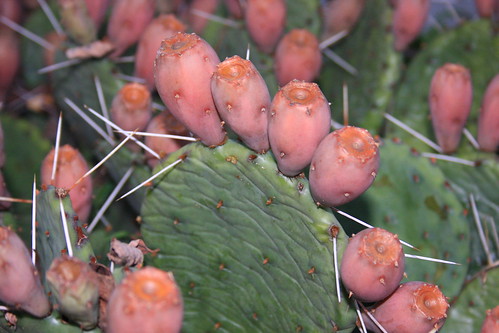
Fruits of the prickly-pear cactus.
(*photo credit)
August 25, 2013 Those Impoverished Choosing to Move Forward
Yes, there are those now last who will be first, and those now first who will be last. (Luke 13:22-30)
People can rise to occasions that others never expected, and they can achieve the unexpected all through God's grace. We know or hear of individuals who rise from obscurity to be great leaders, reformers, and saints. What about entire groups of people? We Americans regard the backwoods colonists as doing this during our eighteenth century American Revolution (perhaps that example had some flaws, for wealthy planters were involved in leadership roles and slavery was continued).
The quest for freedom and democracy is a long one for the poor; however, with encouragement in solidarity we can tackle our limited system and make it ours in the fullest sense. Freedom is not to be given by the privileged but taken by the lowly. Believers in authentic change are convinced that God can display power when we least expect. God empowers, but so that privileged are not repeated by reformers, we must not forget Power's Source.
Through sacred history, God gave an invitation to Israel as a chosen people to profess the one God and welcome and accept the coming Messiah. Jesus Christ came among us, lived, suffered, died and rose. Those chosen first, hesitated, and did not accept Jesus as Messiah. The invitation extended to the Gentile world, and so those who were last were invited into the divine family. This message that went out and was received still goes out to a highly stratified materialistic society. God's invitation is extending to the unevangelized through our efforts. Yes, disparity of wealth grows thanks to the super-rich's power to influence media and politicians. However, in the democratic spirit where responsible action is the birthright of all humanity, we acknowledge this right and encourage all to accept their empowering opportunities.
Our solidarity with the poor is fortified when we "become" the poor and accept our condition of impoverishment along with the struggles of others who do not see clearly. We are part of the culture that has been socially addicted; we find ourselves either allured by certain material things or we do not challenge the addicted. We the poor can only rise when arising in solidarity. We cannot tolerate continued impoverishment because it is so demeaning and so threatening to our culture and humanity. We must work together. In the process we choose to live simply so that we can all simply rise together and reclaim our commons. The imperative before us is to encourage the last to be first.
Prayer: Lord, give us grace to see the rise of the poor as part of your Divine Favor to all. The elite and privileged must
give way to the poor as authentic witnesses to the Good News and we the poor must assist them in seeing the wealthy's own actual state of spiritual impoverishment.

Blaze of color purple.
(*photo credit)
August 26, 2013 Be Kind to Humankind Week and Total Health Care
The greatest kindness that can be shown to humankind is to share available health facilities. We realize that this is not the case today, for human health benefits vary from nation to nation. Today, we find it challenge enough in our own country to give health coverage to each and every citizen, but what about ALL people on this planet? Is the goal too lofty or is it something that must be worked towards with the proper use of often under-utilized or partly wasted resources?
Reclaiming the Commons brings this out in Chapter Five that is worthy of emphasis this month:
-------------------------
Health Insurance for All
Health insurance is a complex and contentious policy issue in America today. Many of the decisions to hire new people come down to health insurance costs. For many, even co-payments are beyond current budgets. Health costs stand behind major decisions on every level of government. Henry Simmons of the National Coalition on Health Care scoffs about affordable health care when the greatest expense is due to "pushing paper," or a complex bureaucracy that costs between $300 and $500 billion each year. The health care system has spiraled out of control without giving a better quality of care. In fact, health care costs are foremost concerns even among those currently covered by health insurance, and by the American government with the implementation of portions of Obamacare. Merely making costly medicines and health technologies available does not ensure better health, only higher costs and concern by those finding it difficult to pay, for unpaid health bills are still the leading cause of bankruptcy. Is health care access for all seven billion of the world's people totally "off the table?" We hope not.
Health care personnel shortages compound the problem. In 2009, the U.S. had an estimated shortage of 200,000 nurses, and especially male nurses. Worldwide, the shortage may be three million nurses alone. Now add on the millions of people needed for service personnel, cooks, nurses' aides, administrators and, of course, doctors, and consider the ten million who could be employed in meaningful work, if employment funds could be found and made available to these potential caregivers. Why should the most promising medical personnel migrate to richer lands when needed in their homelands? And why should potential medical personnel fail to obtain a proper education due to lack of funding?
---------------------------
Prayer: Lord, give us a sense of care for not only our immediate loved ones or our nation's citizens but for people in every land on our planet.

A hawk moth blends easily with surroundings.
(*photo credit)
August 27, 2013 Reflect on the Church as Compassionate
When the Lord saw her, he felt sorry for her. (Mark 7:13)
The conclusion of the Chapter on health in Reclaiming the Commons is appropriate when we celebrate Mother Teresa's life:
------------------------------
We are committed as Church to extend a higher quality of life to all people on this planet. To suffer is part of our human condition, and to suffer alone is painful enough; to suffer with others is compassion, and we are called to globalize our compassion, a divine/human thrust towards greater solidarity. Our future as brothers and sisters involves the harmony resulting from knowing the condition of others and doing something about it. As neighborhoods grow globally and come closer, an awareness of lack of health care access deepens within us. An unhealthy person suffers as much in Africa as in my town. In compassion, the Church speaks up for the health of all, not just local individuals.
Compassion goes out to all who cannot afford good access to health care. The Church must never simply settle for limiting our compassion because of the immensity of the task. God gives life and good health; we are called to the commons of enlivening by extending shared health benefits to wider arenas of people. Those who believe in the future see this in both short-term physical health and longer-term eternal blessings, for death is a hiatus, not an end. We make no limits to extending compassion to all.
Action 1 -- Promote universal health care.
If access to proper health care is a human right, it ought to be proclaimed with courage: we believe in the possibility of universal health care -- and we will do what we can to bring this about. To affirm the possibility of universal health care is the first step in affirming the empowerment by God to help us achieve our goals. We CAN give health access to a world. On November 18-19, 2010, Pope Benedict XVI spoke at the 25th International Conference on Health Care. He stated that it is the moral responsibility of nations to guarantee access to health care for all citizens, regardless of social or economic status or their ability to pay; great inequalities exist in global health care.
Action 2 -- The Church sponsors health care facilities.
The charitable work of the Church without regard to race, creed, or color is a mark of pride. We as Church must continue to be a major health care provider in this world, from Europe to far-flung Oceania. For centuries, the institutional Church has sponsored hospitals, clinics, hospices and other care facilities. This health care system is America's largest, and private elder
care facilities are expanding rapidly even in China and Africa.
-----------------------------
Prayer: Lord, help each of us to be compassionate in what we do and in the manner we enter the lives of others.
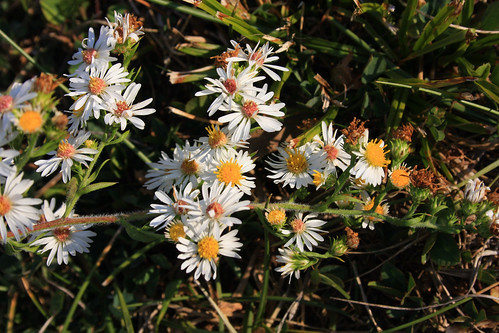
Spectacular blooms of the frost aster, Aster pilosus.
(*photo credit)
August 28, 2013 Watch out! Electronics May Lower Practical Skills
When a blackout occurs during a storm or on other occasions we are often at a loss as to where to turn for lighting or heating or how to save refrigerated contents. It seems that we are without limbs and eyesight for a brief moment; we quickly wake up to how dependent we are on electricity for ordinary life. It is not like Great Depression days when our family avoided costly electricity and lived with kerosene lamps, ice boxes, and cooking stove boiled water for baths -- and we survived. Has the world become too dependent on electricity and electronic devices even though needed in emergencies and are defined now as necessities?
Are we losing communication skills? I have been astounded at watching ordinary people assembled but not talking to each other; they are each juggling with their electronic devices and perhaps texting friends or partners with important messages -- or at least appear important in doing so. Recently, two people in the next restaurant booth did not say one word to each other throughout their meal, both were busy texting. Have they lost the skill of talking to one another?
What about basic math skills? I have noted that in handing exact change to keep from getting more coins some salespeople pause. They find it difficult to count and make exact change without the use of a computerized device. Are basic skills of arithmetic being lost in a computerized age? Teachers tell me of similar observations of students who find simple adding and subtracting harder without some sort of hand held computer device.
What about map reading skills? We like to have a general idea of direction and connecting roads when driving. Today, cars are equipped with electronic devices that tell exactly where to turn and how far to the next road. Map-reading is passé for some but ought it to be? We need to know our general overall locations and routes and thus better control the situation.
What about driving skills? We are all too aware of others distracted in the nearby vehicles as they text some distant party. I do not like to be too judgmental for I am at times distracted by radio adjustment or seeking a sip of water. However, there are too many accidents that are traceable to texting and the concern is causing legislators to devise new driving regulations.
What about building skills? As a youth I learned house construction with no electric hookup because my dad feared that electric saws and other devices could physically harm his youthful brood. We built houses without electricity. In essence this continued in later building days, but electric connections are vital for construction trades. However, today can people use hand saws and hammers and digging tools easily?
Prayer: Lord, lead us to use conveniences well but to be
mindful of the need for basic skills in conducting our lives.
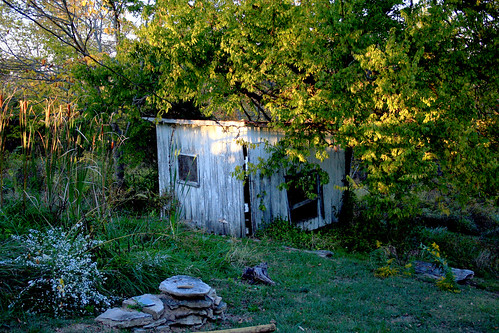
Lush, late summer vegetation overtakes shed.
(*photo credit)
August 29 2013 Security and Insecurity in Today's World
As we approach Labor Day, let us Americans look once more at our basic securities and insecurities to make ends meet. Food insecurities bedevil many of the world's poor and that includes some Americans who also suffer from lack of funds to meet normal housing and energy basic needs. Insecurities beset those finishing an expensive education with impending debt to be repaid and few good job prospects in sight. Insecurities occur too frequently for those threatened by health problems. What about the wealthy who never have enough, and so have an insatiable quest for more security in one or other fashion?
Insecurities are hard to tackle. At this Labor Day Weekend should we consider trying to overcome our personal insecurities, or avoid them and focus on national insecurities of a weak economy? What about war or peace issues? Implementation of a national health care program? Drug problems of all types? The right to bear arms or have arms control? The quest for security becoming all the more paramount for those overwhelmed by insecurities? A vigilant police force and safe highways? Food security through food stamps? Fragile communication and alert systems? Threats persist, accidents occur, food poisoning springs when unexpected, and communications can blank out at times. We all need convincing that material means of security are not fool-proof, and this becomes painfully clear with each new crash or massacre.
Total material security is impossible. Is the insurance sufficient? Do we take all protective measures with food purchases? We gradually become aware that taking additional protective measures in never enough. Here the fine line between material and spiritual security begins to emerge on a personal and on a broader level. Neither my home nor our nation's security rests on more guns (for that can make us more insecure). We do not secure more friends by stockpiling nuclear warheads and constructing more aircraft carriers. Material possessions can bring nothing but greater insecurity. Selfish grasp for limited resources to secure ourselves only makes the basic insecurity of the world's have-nots all the greater. Security will only come when we halt the excessive use of resources (financial and others) by a privileged few and share these with a world of basic insecurities. Now we can open the door to true security for all.
True security comes through loving trust in God, who inspires us to take limited amounts of goods and at the same time move to redistribute materials to those in greater need. The act of sharing is the secret to authentic security for, by sharing all we have, we build up a lasting security that remains for all eternity.
Prayer: Lord, in you we trust for you are our rock and ultimate security. Some trust more and thus are free of the shadows of insecurities; others are to be taught through our encouragement and assistance that you are our true security.
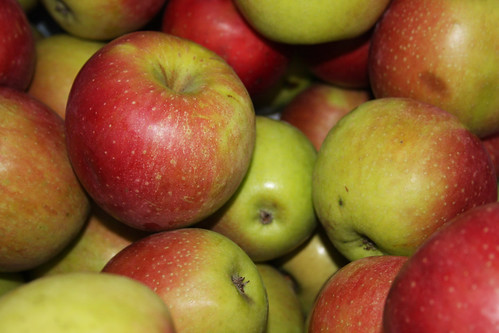
Harvest of fresh apples.
(*photo credit)
August 30, 2013 The Power in Accepting Our Limitations
Labor Day is the end of traditional summer vacation, and we come to realize limitations on the warm season. Have you read or reviewed a serious essay and admit you do not understand some or all of it? I wager that I have company. In earlier times I would lay a difficult article aside to study when more time permits. But that never came. The excuse is only admitting my own intellectual AND time limitations as we age and find too much to still do in an ever-shortening span ahead, and an ever-increasing stack of unstudied materials. Should we put things off to eternity?
Limitations beset us in ways we do not want to admit. Let's face it, there are things that remain a mystery whether unknown to all but God or unknown to most of us inexperienced ones. I do not understand the workings of CERN and its advances, the limits of the universe in starry space, the vast fields of biological research, and the mysteries of economics (though the last is perhaps a mystery to all, even experts). Some philosophers tell us that the quest for scientific discoveries is quite compatible with that of religious belief in God -- and so we become comfortable with being unable to know all truth and to rest in the glory of Mystery.
Our limitations span a multitude of areas from current location, present age, cultural attitudes, intellectual acumen, personal endurance, occupational skills, material resources, physical health, and on and on. We are limited but let's not forget the limits of our time span, of which we are more conscious with each passing day. Some accept their limitations with greater ease than others. It is not right to dismiss an arena by saying that a field or skill is not worth learning. Nor is it sufficient to grasp greedily for more of the limited physical pie and be left in a case of immense health-threatening stress.
Accepting our limitations is humbling but herein is contained a certain knowledge of self that leads to wisdom (Psalm 90). Humble acceptance and trust in God opens vast horizons of spiritual growth. Much is gained by humbly accepting physical limitations whether inherent, imposed, or caused. In due time and with prayer to help we can learn to feel at home with being limited human beings. Yes, this is how we are created and it is meaningful to know who we are. This knowledge opens a horizon to advance spiritually beyond the bonds of human limitation. Theresa, the Little Flower, learned this lesson early on and was able to grow vastly in spiritual realms in an ocean of God's love where there is no ultimate limitation. Eternity reaches beyond the physical limitations in which we find ourselves. Let's consider tasks we are called to do, those we wish to do, and those impossible right now. See "Limits to Physical but not Spiritual Growth" (3/16/13).
Prayer: Lord, teach us to know our physical limitations, to be able to adjust to them with trust and a degree of spiritual peace, and to teach others to realize and live with their own limitations. Let this trust be truly empowering for those with faith.
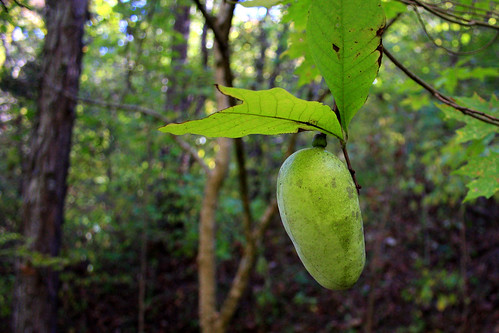
Paw-paws, ripening on the tree.
(*photo credit)
August 31, 2013 Paw Paws: Our Grandest Native American Fruit
On the Cherokee National Holiday it is an ideal time to celebrate a prized Native American fruit, the paw paw or papaw. In the small cove next to the solar house at the ASPI Nature Center was a cluster of small trees that had the grandest of native fruit (in size and to some folks also in taste) -- Asimina triloba of the tropical custard apple family. This temperate member of a tropical fruit family has a taste that resembles a mixture of banana, mango, and pineapple. Perhaps it is a tropical tasting temperate fruit.
Kentucky is a more popular area for growing paw paws but in fact its growing range covers much of the Eastern U.S. south of Michigan and east of the Mississippi River. This largest of our native fruits is ordinarily a half pound each, but some reach one to two pounds depending on variety. The fruit was recognized by De Soto in his sixteenth century expedition through the Southeast; it was grown by Thomas Jefferson, who while minister to France, took seeds to Europe to show off a wonderful Native American fruit.
Several reasons for lack of current familiarity include the shortness of shelf life at room temperature (less than a week), though its life can be tripled by refrigeration. The fruit is not overly attractive, is thin skinned, and is not overly colorful. The availability has sharply declined in recent years perhaps in part by loss of native shade, for paw paws plants are highly sensitive to ultraviolet light.
Paw paws can furnish a host of novel and traditional culinary delights. Paw paws can be mixed with other fruits for blended fruit drinks and inserted into interesting salads. They can be made into ice cream and ices, added to pies, cakes, puddings, custards, and yogurt. The large seeds are generally easy to remove. The fruit's nutritional value is being determined, and preliminary research shows paw paws to have high anti-oxidant properties along with being a source of vitamins and a number of essential minerals.
As the paw paw regains favor in this area, some (including the web manager Janet Powell) are engaged in numerous plantings and even partial or full orchards. Since the varieties are generally highly sensitive to full light, shaded areas and even protection in early years using cloth covering is often recommended. As the trees grow in popularity, more nurseries will offer existing and new varieties. Note that our tree source (Stark Bro's) offers four varieties (Sunflower, Seedling, Mango, and Pennsylvania Golden) and these can be grown in American zones 4 to 8. Other nurseries found on the Internet offer new and exciting varieties as well. Most of these varieties ripen in middle to late September and October; so be on watch for the taste of upcoming autumn.
Prayer: Lord, direct us to know the good fruits that abound all around us. Inspire us to acquaint others with tasty produce so that each might enjoy knowing more about our productive Earth. |

